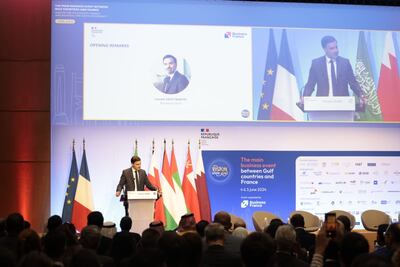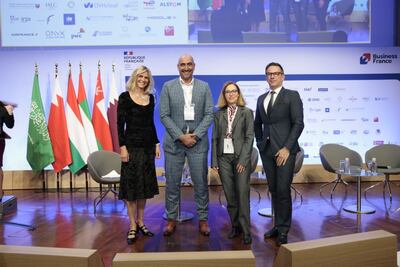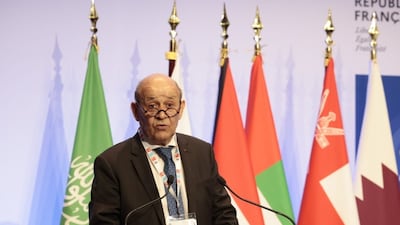Senior French and Gulf officials rounded up a two-day business forum in Paris on Wednesday with the joint ambition of strengthening ties in advanced technologies and artificial intelligence in a competitive business environment.
French-GCC trade relations recently increased but that is mainly due to a rise in energy prices, and French exports to the region remain limited to sectors such as aviation and cosmetics, according to the economy ministry.
“We can do more and better,” Axel Baroux, Middle East managing director of Business France, a branch of the ministry that promotes French business abroad, told The National.
“The reality is that the area is really competitive. The entire world wants to do business and exchange with GCC countries. So, we have to be present and that is why we organise such events,” he said, referring to the second Vision Golfe forum.
Close to 1,000 business representatives from France and six Gulf countries gathered for business meetings at the economy ministry's headquarters in Bercy, as senior officials from several countries gave speeches encouraging them to strike deals.
French delicacies, including sweet and savoury macaroons, halal meat pies – “pate en croute” in French – were on offer from companies seeking to further expand their presence in Gulf markets.
“Gulf countries like Saudi Arabia are highly attractive,” said Mustapha Bahman, owner of France Originelle, which represents several French companies that export to the Gulf. “Made in France is a sure value.”
Speaking to The National, Oman's Energy Minister Salim Al Aufi said it was important to send the message that his country was “not only focusing on the US, the Far East or Germany”.

“They are all important,” he said. “But I think the relationship we built with the French companies … is also important for us in order to address the energy transition of the Gulf world.”
The forum kicked off with a pre-recorded keynote address by Economy Minister Bruno Le Maire.
“Gulf countries have taken a major turning point in emancipating themselves from the energy and gas sector and nurture high added-value sectors for the future,” he said.
“France is therefore ready to share its expertise in infrastructure, industry, tourism, health or even advanced technologies,” added Mr Le Maire.
“I am thinking in particular of artificial intelligence, which is an exceptional field of co-operation between France and the Gulf states.”
French direct investments in the Gulf reached €8.7 billion (about $9.47 billion) in 2021, a figure which is slightly above Gulf investments in France (€8.3 billion).
Mr Le Maire was last month in Kuwait and the UAE, where he signed am agreement to collaborate in developing AI.
He boasted that his country was the “most attractive country in Europe” with the ambition to become the “first low-carbon economy” of the continent by 2040.

The Economy Minister, who did not explain his absence from the forum, has been busy with the fallout from the recent downgrading of France's credit score by ratings agency Standard and Poor's.
The US agency justified its decision to drop France's long-term sovereign debt rating from “AA” to “AA-” on concerns over lower-than-expected growth.
Mr Le Maire vowed to “continue exactly on the same path, without accelerating or slowing”, in a video posted on YouTube on Saturday.
Also speaking at Vision Golfe, chairman of the French Agency for AlUla Development and former defence minister Jean-Yves Le Drian alluded to the Gulf countries' role in working towards an end of the conflict in Gaza.
“In the context we know in the Middle East, Gulf countries occupy a determining place for the future and the stability of the region,” he said. “France has always been stood alongside its Gulf allies to ensure stability and economic prosperity.”
Two memorandums of understanding were signed during the forum: the first between the city of Marseille and the Saudi port authority, as part of a new economic corridor to join India to Europe via the Middle East, and the second to support companies based in Bahrain to access French markets.
For Gulf countries, there is also competition to attract investors from abroad, and a transparent legal framework is a key part of that process, said Khalifah Al Yaqout, managing partner at the Kuwait-based Al Yaqout and Al Fouzan corporate law firm.
“Kuwait wants to change the image that we only have oil and gas,” Mr Al Yaqout said.
“But still our laws are old and date back to 1960 … I think it's time to follow Saudi Arabia, the Emirates and Qatar to have our own arbitration law.
“This will protect investors to have more trust in investing in Kuwait. The government knows that, and they are working on it,” he said, to applause in the room.


